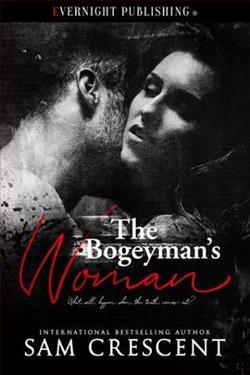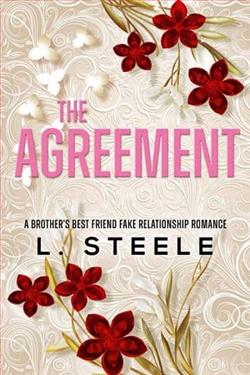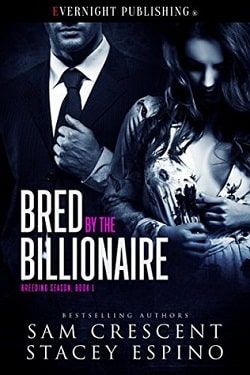Page 109 of The Killing Plains
But if Dave Carroway was telling the truth, Willis was as much an innocent victim as Adam and Denny. His life had been an unmerited hell. There could be no amends for that.
With these gloomy thoughts roiling in her head, Colly eventually dozed off. She woke, groggy but restless, before the alarm sounded. Showering quickly, she drove to Brenda’s house in the hope of catching them before they left for school.
Satchel was thrilled to see her and babbled happily as she applied the prescription sunblock to his pale skin. When she told him that he was going to spend that night with his cousins at the ranch because Colly and Aunt Brenda had a dinner engagement, he clapped excitedly.
“Grandma Iris and Alice are going to take you to the Rattlesnake Rodeo after supper,” Colly explained as she helped him with his sun-sleeves.
Brenda looked up from packing lunchboxes. “No, that’s off. Alice has a date, and Iris doesn’t want to wrangle three kids at the Rodeo by herself. They’re going to swim and watch movies, instead.” Brenda had promised to take Logan and Minnie to the Rodeo the next afternoon. Satchel was welcome to join them—and Colly, too, if she liked.
Colly shuddered and said she’d think about it.
Reassured by Satchel’s happy mood, Colly hugged him goodbye and drove to the station, where Avery was waiting for her in the parking lot, a Starbucks cup in each hand.
“Triple-shot latte.” Her face bore an abashed, uncertain expression. The coffee was a peace offering after last night’s revelations.
Colly forced a smile. “Triple-shot? I hope you brought a defibrillator.” They got in the car.
“I talked to Carroway a few minutes ago,” Avery said. “His shrink can see us if we’re there before noon.” She latched her seatbelt. “I don’t see why we can’t just call the guy, though.”
“Shrinks are like cops—they’re used to getting information, not giving it. I want to see his face, read between the lines.”
They drove in silence along Market Street. Once on the highway, Avery engaged the cruise control and glanced at Colly. “What are you thinking?”
“This case has me stumped.” Colly leaned against the headrest. “We’ve got two dead boys and two rabbit masks—not counting the ones in Willis’s cabin and Satchel’s suitcase. Before last night, I thought we were probably dealing with a serial killer, and the masks were a signature. But thereisno serial killer. So what are the masks about? I can’t make the puzzle pieces fit.”
“Maybe Denny’s murderer’s not a serial killer, but he’s still a psychopath. Last night you said Willis could’ve been so messed up by finding Adam’s body that it triggered some homicidal urge.”
Colly sipped her coffee and grimaced. “You nixed that theory.”
“I said it couldn’t be Willis. But what if someone else found Adam—someone young and impressionable?”
“A budding psychopath with a rabbit fetish?”
“Why not? Whoever posed Adam might’ve been excited by the uproar it caused and wanted more, but this time, he had to kill to get it.” Avery changed lanes and began to edge past a slow-moving cattle truck. “Maybe Earla’s right—the murderer leaves the masks because he wants a cool nickname.”
Colly reached to close the vent as the stench of cow manure filled the car. “Except police never released that detail to the press.”
“Maybe the killer figures it’ll come out eventually. Or maybe he just wants to play catch-me-if-you-can with the cops.”
“That doesn’t feel right. There’s something tender about the way Adam was posed. I think whoever did it cared about him. With Denny, it was different.”
“Twenty years is a long time.” Avery eased back into the right lane. “Maybe the killer changed. Maybe he’s conflicted. Psychopathic criminals are emotionally complicated, right?”
Colly set her cup in the cup holder. “They’renot—that’s the thing. There are smart ones and stupid ones. But I’ve never met one that’s deep. The ones I’ve arrested are like cardboard cutouts of people.”
“Dangerous, though.”
“To a point. They have no feelings for anyone but themselves, so most of them go through life pissing off the people who know them best. They leave a trail a mile wide, if you know what you’re looking for.”
“Then why are serial killers so hard to catch?”
“Because they usually choose their targets at random. And some of them like playing games, which stirs up a lot of publicity. That complicates things. But once you do identify a suspect, it’s not hard to build your case. They don’t talk and act and think like normal people. Interrogate them for five minutes, and you spot it. They’re like bad poker players—they can’t hide their tells.”
“You don’t think we’re dealing with a psychopath here?”
“If we are, it wouldn’t be the worst-case scenario.”
“What would be?”















